FG IV Scientific / Technical Project Officer The Joint Research Centre (JRC) is the European Commission’s in-house science service. The Joint Research Centre’s mission is to provide EU policies with… Read more »
Read Full »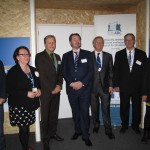
ICE-ARC Side Event at COP21
ICE-ARC was proud to take part in this year’s historic Paris Climate ChangeConference in December (COP21). Our programme co-hosted an Arctic Side Event with the EU-funded consortium programme EU-PolarNet and… Read more »
Read Full »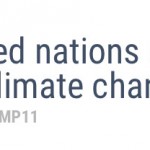
COP21 Side Event: Climate Change in the Arctic
Arctic Change – What this means for you This 90-minute European Commission Briefing Session, hosted by ICE-ARC, EU-PolarNet, and the European Polar Board, focusses on the increased prominence of Arctic… Read more »
Read Full »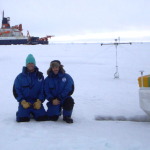
Summer Buoy Deployments
By Christine Provost, Senior Marine Scientist, Université Pierre et Marie Curie (UPMC) ICE-ARC scientists participated to two summer campaigns on board icebreakers to deploy autonomous instruments. One cruise was operated by the Korea… Read more »
Read Full »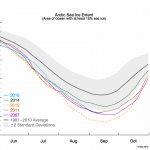
Arctic sea ice reaches fourth lowest minimum
On September 11, the National Snow and Ice Data Centre (NSIDC) reported that Arctic sea ice reached its likely minimum extent for 2015. The minimum ice extent was the fourth… Read more »
Read Full »World Economic Forum Arctic change blogs
ICE-ARC members have written a four-part series of blogs for the World Economic Forum website in which they discuss how Arctic summer sea ice affects our global economy, our lifestyles… Read more »
Read Full »ICE-ARC General Assembly Bologna, Italy 2015
REGISTER NOW The second ICE-ARC General Assembly will be held in Bologna, Italy. ICE-ARC partner CNR (Consiglio Nazionale delle Ricerche) has kindly offered to host the meeting at the CNR Congress Centre Date:… Read more »
Read Full »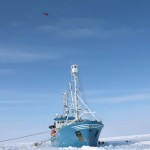
Overflight by research aircraft from British Antarctic Survey
By Mats Granskog, Chief scientist, and Polona Itkin, Research scientist, sea ice dynamics – April 27 2015 Another overflight over RV Lance was successfully completed on Sunday 19 April. This… Read more »
Read Full »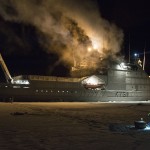
Buoy deployments on Arctic sea ice
It is not common to encounter research vessels cruising through the Arctic ice pack in mid-winter. Thick and consolidated ice, polar night, and extreme weather conditions do not allow researchers… Read more »
Read Full »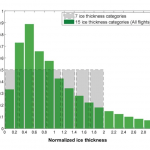
A major source of uncertainties in sea ice models revealed
Sea ice models compute the thickness of sea ice and the area covered with it based on physical equations, which describe the relevant natural processes. Some processes, however, cannot be… Read more »
Read Full »

